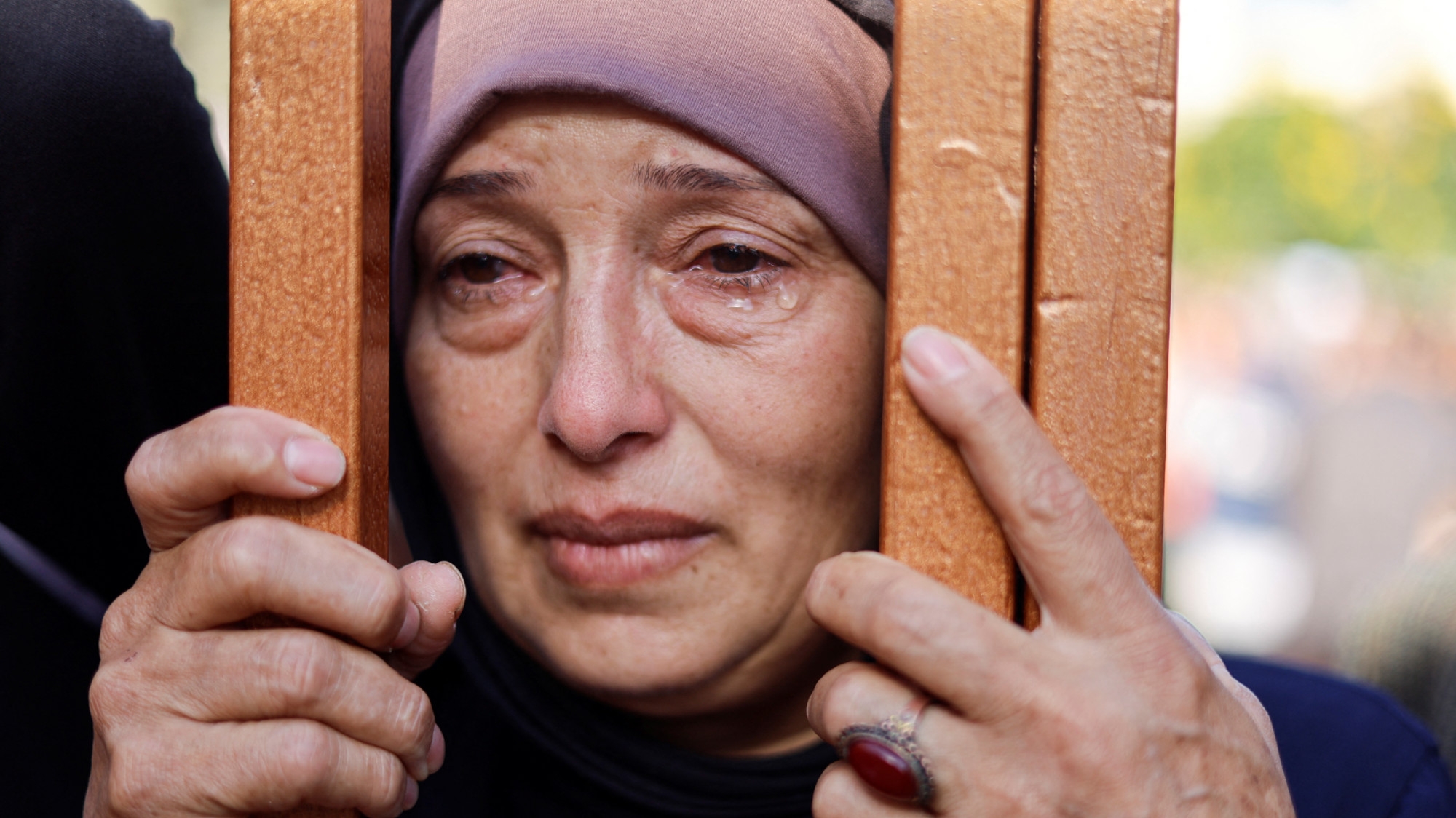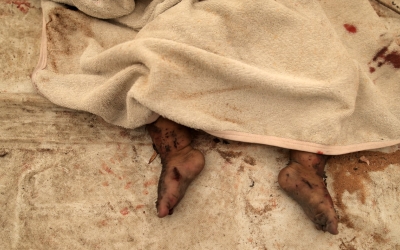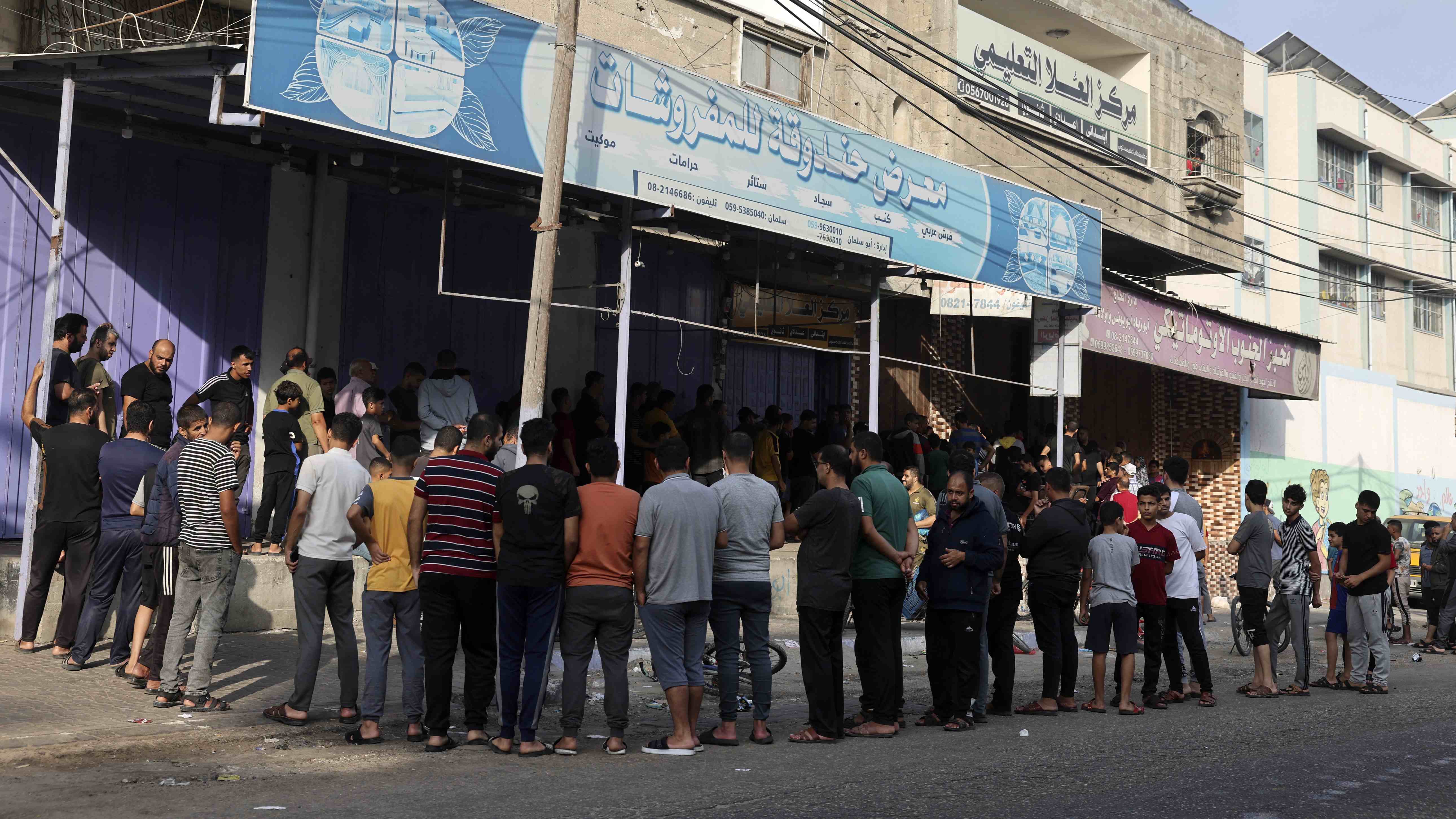Israel-Palestine war: Siege and shelling 'wants to return Gaza to the stone age'

Crowds of men patiently stand outside the Al-Sunbula bakery in the Deir al-Balah refugee camp in central Gaza waiting to buy bread after its machines broke down.
It has been two weeks since Israel cut electricity and fuel supplies to Gaza and most bakeries have closed their doors, leaving two million people at risk of starvation and malnutrition.
With the war now in its third week, the few bakeries that are still running are becoming well-known names among residents of the besieged region.
“I have a family of nine and around 15 other relatives are staying with us,” says Abu Bakr Zinati, a resident of Deir al-Balah.
“This usually means we need at least a bag of 50 loaves every day,” he tells Middle East Eye.
“But since the start of the [Israeli] attack, we’ve only been able to get 20 loaves a day because bakery owners are trying to make sure they can cover the needs of as many households as they can.”
For Zinati and other Palestinians in Gaza, survival means not only avoiding Israeli bombardment but also making sure they are able to get a hold of basic staples like bread.
“In the past week, we have been struggling to find bakeries that are still open and operating,” Zinati says.
“Now the owner of this one just told us that the fuel running the power generator has gone.
“I don't know what we'll do now, more bakeries are closing their doors every day.”
One crisis amongst many
Lack of fuel affects not only the bakeries in Gaza’s refugee camp but also means supermarkets have no way of refrigerating produce and desalination plants cannot operate.
Food, generator-produced electricity, and water are now at extremely low levels following the Israeli bombing campaign in Gaza, which began in response to an attack by Hamas-led Palestinian fighters on 7 October.
Israel imposed a complete siege on the already-blockaded strip after the attack.

In practice, that means no food, water, fuel, medicine, or electricity can enter Gaza.
Israel has also bombed and continues to threaten to bomb the Rafah crossing that Gaza shares with Egypt.
That means aid sent by the international community cannot enter the area without hard-fought negotiation.
The most recent exception was for around 20 trucks loaded with medical supplies and food assistance, which entered Gaza from Egypt for the first time on Saturday.
“We used to receive around one to four hours of electricity a day during the first week of the assault,” says Zinati.
“Now we do not receive any electricity supply. We cannot recharge our phones to call each other nor can we watch TV to see what is going on around us.
“We just hear bombing around us all day but we don't know where it is coming from,” he adds.
Follow Middle East Eye's live coverage for the latest on the Israel-Palestine war
While the vast majority of Gaza residents do not have access to power, many rely on FM radios to listen to the news and find alternatives to TV and the internet.
But even radio can be interrupted as local stations are subject to frequent Israeli hacking attacks.
“We keep the radio on almost all day long because it is our only source of information,” Zinati explains.
“But every now and then Israeli forces hack local stations and broadcast recorded messages telling residents not to support Hamas, and threatening retaliation against anyone who does.
“They also regularly ask residents to evacuate their homes and move to the south of the Gaza Strip,” Zinati continued.
‘Stone age’
Information is secondary to the immediate needs of life and access to the basics remains the main concern for Gaza’s people.
More than 1.5 million Palestinians in the region face water shortages. Local authorities have been unable to supply the area with water after Israel cut water supplies.
Many residents are now pumping water from wells but that comes with risks and supplies can be contaminated with seawater and wastewater.
The desperation is evident in the al-Zawaida area of Gaza, where many have fled, seeking refuge with relatives and friends.
With so many new arrivals, supplies do not last long.
'If there are five boxes of bottled water in a supermarket, we take one and leave the rest for other families'
- Rabha Saqer, Gaza resident
“We fill two water tankers every couple of days when the man distributing drinking water comes to our neighbourhood, and we pay around three Shekels ($0.76) for each tanker,” Rabha Saqer, a displaced mother of five, told MEE.
“But the water runs out a few hours later because we are an extended family of around 30 individuals staying at our in-laws' home,” she adds.
“When there is no water, we cannot even cook, we are relying on canned food that is gradually running out in the supermarkets.
“My kids are asking for homemade food, my heart is aching for them, especially for the young ones who need to eat healthy at this age.”
With the increasing demand for drinking water and the complete closure of Gaza's borders, shop owners are also unable to restock empty shelves with bottled water.
“We are able to buy small amounts of water and food day by day, but we cannot stock up on food or water because even the markets cannot provide much,” Saqer continues.
“If there are five boxes of bottled water in a supermarket, we take one and leave the rest for other families.
“We are left without food, water, electricity, fuel, or internet. They [Israelis] want to return Gaza to the stone age.”
Middle East Eye propose une couverture et une analyse indépendantes et incomparables du Moyen-Orient, de l’Afrique du Nord et d’autres régions du monde. Pour en savoir plus sur la reprise de ce contenu et les frais qui s’appliquent, veuillez remplir ce formulaire [en anglais]. Pour en savoir plus sur MEE, cliquez ici [en anglais].





